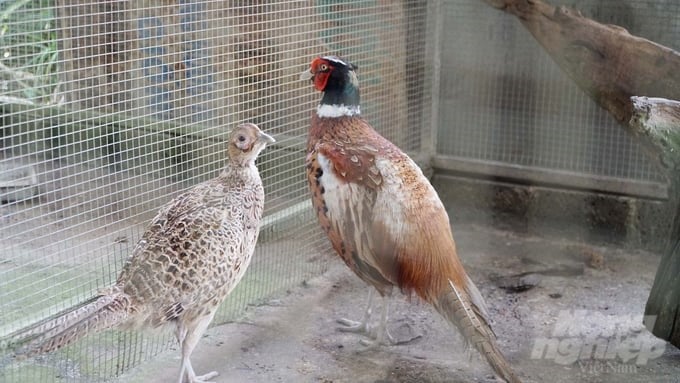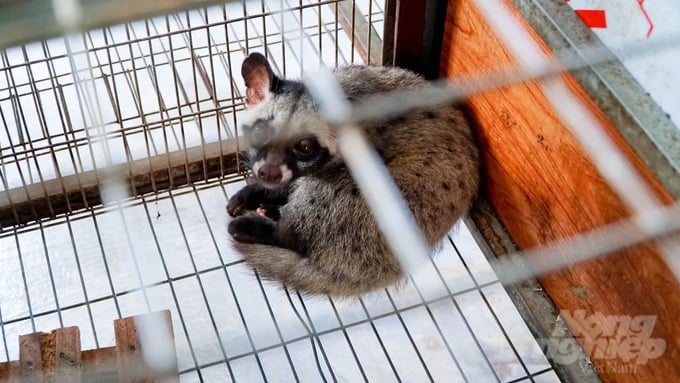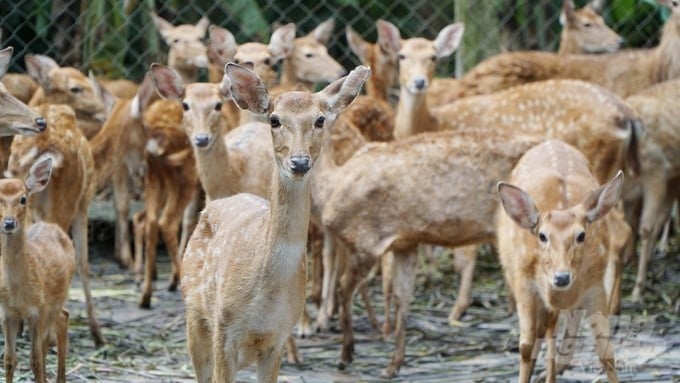June 2, 2025 | 21:01 GMT +7
June 2, 2025 | 21:01 GMT +7
Hotline: 0913.378.918
June 2, 2025 | 21:01 GMT +7
Hotline: 0913.378.918

More and more households in Dong Nai transform to raising specialty animals because it brings high economic value. Photo: Le Binh.
The livestock capital of Dong Nai has recently had a clear shift. Large-scale, linked livestock farming is an inevitable trend, requiring businesses and farmers to transform if they do not want to leave the game.
Since the African swine fever epidemic at the end of 2018 and the frequent disease situation in poultry flocks, a series of small farming households have given up. In addition, the price of animal feed increased and output was unstable, causing small farming households to continuously suffer from losses and barely survive.
To help farmers have a sustainable direction, Dong Nai's livestock orientation is to develop specialty and indigenous animals with the locality’s advantages in order to improve economic efficiency. Of which, licensed wildlife farming is an effective approach that many farmer households have successfully applied.
Mr. Tran Lam Sinh, Deputy Director of the Dong Nai Department of Agriculture and Rural Development, said that in addition to cattle and poultry farming, the licensed wildlife farming industry is also an advantage of Dong Nai province. These models are proving to have higher economic efficiency and much more stable output than other animals. Of course, all farming facilities are managed by the Dong Nai Forest Protection Department, which issues "birth certificates" for each animal.
According to statistics, the total wildlife herd in Dong Nai currently has up to millions of heads in more than 700 farming facilities, with 73 different species. Among them, it must mention about 57 civet farms, 50 bamboo rat farming households, 30 hedgehog farming households, 154 deer farming households, etc. spreading throughout the province. These models are currently bringing a profit ranging from VND 200 million to nearly VND 1 billion/year, depending on the scale and species of livestock.
“Every year, the Dong Nai Department of Agriculture and Rural Development organizes training classes to improve livestock techniques. This aims to help people have the conditions to develop large-scale, market-oriented specialty animal farming. These models are currently sustainable livelihoods for farmers in many localities in the province," said Mr. Tran Lam Sinh.

Compared to traditional livestock, wildlife brings higher economic efficiency, has fewer diseases, and does not require much investment. Photo: Le Binh.
In addition to models of wildlife farming, raising indigenous and specialty animals is also a sustainable direction that the Dong Nai Department of Agriculture and Rural Development is orienting for livestock farmers. Of which, raising black pig varieties and indigenous chickens, or farming with herbs, etc., is blooming in many places in the province.
The Dong Nai Livestock Association is also encouraging small and medium livestock farmers to gradually switch to sustainable models such as specialty animals and wildlife. This both ensures income for livestock farmers and reduces environmental pollution in livestock farming.
However, according to Mr. Nguyen Tri Cong, Chairman of the Dong Nai Livestock Association, the output for these livestock products needs to be carefully calculated to avoid "following the same path of failure".
“We need to calculate how to have directions for output right from the start of livestock farming. Either we can link to create a large source of goods for purchasing businesses, or we can immediately determine the output on the spot... Only then will livestock products be more sustainable," Mr. Nguyen Tri Cong expressed.

Currently, Dong Nai has about 700 households specializing in raising wildlife for breed sale or meat. All livestock are supervised by the provincial forest rangers. Photo: Le Binh.
Mr. Nguyen Quoc Nghi (La Nga commune, Dinh Quan district) has more than 20 years of experience raising specialty species such as crocodiles, pythons, snakes, civet musks, hedgehogs, etc. Instead of choosing to raise a specialty animal, Mr. Nghi chose to raise many animals at the same time to avoid being passive in output and meet market demand. This is also the direction that many farmers are applying, helping their products to always be continuous and providing stable income.
In order for sustainable livestock farming and bringing products further, a number of specialty animal farming cooperatives and farms in Dong Nai have invested in farming according to VietGAP and organic standards, building a linkage chain from production to consumption, registering OCOP products, or combining many forms of promotion to bring the product to more consumers.
Doc Mo Farm Cooperative (Thong Nhat district) is providing many specialties to the market, such as wild boar, rabbit, etc. All products from plants and animals at the farm are produced organically. According to Mr. Hoang Cong Phuoc, Director of the Cooperative, thanks to its safe livestock farming and creativity in preparing unique dishes, specialties are very favored by tourists.
In many livestock households, farm owners also set up YouTube and TikTok channels to introduce their specialty farms. Thanks to that, the direct customers will be coffee shops and restaurants that order retail directly and more frequently. Thereby, this connection and promotion also help promote the local economy.
Translated by Huyen Vu Thu

(VAN) TTC AgriS and IFC signed a strategic partnership to develop a sustainable agricultural value chain, aiming to achieve the Net Zero target by 2035.

(VAN) Seafood by-products are opening a new path, combining green growth and technological innovation to enhance the industry's value.

(VAN) Mr. Nguyen Thanh Cong, Vice Chairman of the Son La Provincial People's Committee, reflects on Son La’s journey from barren hills to fruitful orchards after a decade of hard work.

(VAN) FAO’s Director-General addresses the 5th Baghdad International Water Conference.
/2025/05/26/1716-4-nongnghiep-191706.jpg)
(VAN) Chain linkages, technological innovation, and raw material zoning are three strategic pillars for the coconut industry to strongly develop and elevate its position on the global agricultural map.
![Advanced mariculture – an inevitable trend: [4] Accompanied by scientists](https://t.ex-cdn.com/nongnghiepmoitruong.vn/608w/files/sohk/2025/05/13/1941-pgsts-vo-van-nha-140958_717.jpg)
(VAN) According to Assoc. Prof. Dr. Vo Van Nha, Director of the RIA III, the development of advanced offshore mariculture is no longer an option but an essential path for Vietnam’s fisheries sector.

(VAN) Vietnam is intensifying the development of mollusk farming areas that meet international standards, aiming for sustainable growth and enhancing its export position in the global seafood market.